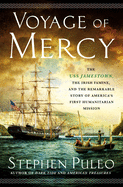
As historian Stephen Puleo (American Treasures) points out in Voyage of Mercy: The USS Jamestown, the Irish Famine, and the Remarkable Story of America's First Humanitarian Mission, the repercussions of the Irish famine of the 1840s still linger. Broad swaths of American society are descendants of the countless Irish people who fled their homeland during the devastation. English-Irish relations were poisoned for decades, because of the appalling decision of the English leadership to allow thousands of Irish people to starve to death while continuing to force Irish farmers to export their crops to England to meet quotas.
As the potato blight tore apart Irish society, and the English turned a blind eye, the Americans came to the rescue. Spurred by cries for aid from such illustrious statesmen as Daniel Webster and Henry Clay, the American populace donated generously. The Jamestown was fitted as a relief ship, and Captain Robert Bennet Forbes was commissioned to undertake the voyage to Ireland with his hold full of supplies, which, in a "happy coincidence," were loaded aboard the Jamestown on St. Patrick's Day, 1847.
Having overcome terrible tragedies in his own life, Forbes was determined to help alleviate the suffering of the Irish. His journey not only marked a pivotal point in American history, but it also laid the groundwork for "the collaborative public-private blueprint... that has guided America's international charitable relief for more than a century and a half."
In this meticulously researched, yet eminently approachable book, Stephen Puleo provides a fascinating glimpse at a little-known facet of a well-known trauma. --Jessica Howard, bookseller at Bookmans, Tucson, Ariz.

